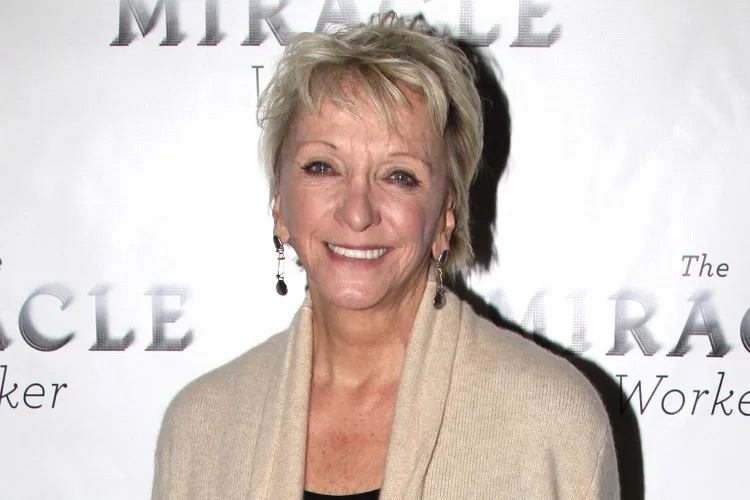Firebrand Rep. Stands by President Despite Brutal Public Spurning – ‘His Remarks Hurt, But I Hope We Make Up’
The fluorescent lights of a CNN studio in Washington hummed softly on that crisp Sunday morning of November 16, 2025, casting a warm but unforgiving glow on Rep. Marjorie Taylor Greene as she settled into the interview chair, her signature blonde waves framing a face etched with the quiet storm of a woman caught between fierce loyalty and fraying patience. At 51, the Georgia firebrand—once the unyielding shield for President Donald J. Trump’s MAGA crusade—had become a lightning rod in her own right, her unfiltered barbs and unapologetic stands turning her into a folk hero for the heartland faithful and a punchline for the coastal chattering class. But this wasn’t another House floor tirade against the Squad or a viral rant on border chaos; it was a raw, real-time reckoning, broadcast live on “State of the Union” with Dana Bash, where Greene laid bare the wounds of a public evisceration that had unfolded just two days prior. Trump’s endorsement—withdrawn in a blistering Truth Social fusillade calling her “wacky” and accusing her of veering “far left”—had landed like a gut punch, reverberating through the marble halls of Capitol Hill and the backroads of Rome, Georgia, where constituents who’d hoisted her to victory in 2022 now whispered of betrayal and unbreakable bonds. As the cameras rolled, Greene’s voice trembled not with defeat, but with the steely resolve of a survivor who’d stared down death threats and doxxing mobs: “I do support him and his administration,” she said, her blue eyes locking on the lens like a vow renewed. “And I support them in delivering the campaign promises we made to the American people.”
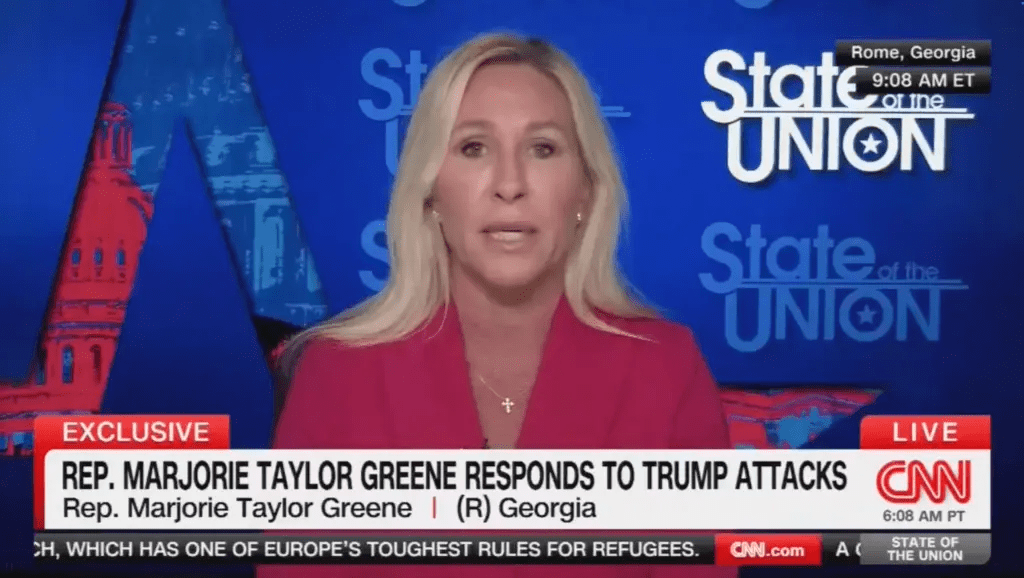
It was a declaration that hung heavy in the air, laced with the ache of someone who’d poured her soul into Trump’s orbit only to feel the sting of his swift sword. Their alliance, forged in the fevered days of 2016 when Greene first donned a QAnon tee at a rally (a youthful indiscretion she’d later disavow), had been the stuff of MAGA legend: her as the attack dog, nipping at heels from Pelosi to Fauci; him as the lion king, roaring her praises from Mar-a-Lago podiums. She’d been his floor whip in the slim 220-215 House majority, her filibuster threats stalling Biden-era holdovers and her Ukraine aid skepticism earning quiet nods from the Oval Office. But cracks had spiderwebbed over months, subtle at first—a nudge here for more domestic laser-focus amid Trump’s globe-trotting diplomacy, a jab there over H-1B visa expansions that she saw as tech overlord giveaways. The fissure cracked wide on November 14, when Trump, fresh from a White House meeting with Syrian President Ahmed al-Sharaa—a former Al Qaeda figure now recast as a post-Assad ally—unleashed on Greene via social media. “Marjorie Taylor Greene has gone completely WACKY and FAR LEFT,” he posted, rescinding his reelection nod for her 2026 bid and branding her criticisms a “disgrace.” The trigger? A simmering spat over the Jeffrey Epstein files, those long-buried documents Greene had championed releasing in full, arguing they exposed elite rot that Trump, in her view, was too cozy with to fully unearth.

In the studio, as Bash pressed on the pain, Greene didn’t flinch—her posture straight as a rifle barrel, hands clasped like a prayer for reconciliation. “His remarks, of course, have been hurtful,” she admitted, the words slipping out with a vulnerability that silenced the crew for a beat, a rare glimpse behind the armor of the woman who’d shrugged off AR-15 taunts from late-night hosts. Hurtful, yes—but not defining. “I certainly hope that we can make up,” she added, her tone a bridge extended across the chasm, evoking the image of two warriors pausing mid-battle to clasp forearms. It was classic Greene: unbowed, yet yearning for unity in a party where fractures could fracture the midterms. Yet even as she pledged fealty, the interview veered into a minefield of her own making, a simultaneous salvo that left viewers—and Trump’s inner circle—scratching heads and firing off frantic texts. On the Epstein trove, she doubled down with the ferocity of a mama bear: “Unfortunately, it has all come down to the Epstein files. I stand with these women. I stand with rape victims, I stand with children who are in terrible sex abuse situations, and I stand with survivors of trafficking. I will not apologize for that.” Her voice rose, eyes flashing with the righteous fire that had packed town halls in Dalton, where mill workers nodded along to her calls for transparency on the financier’s web of powerful enablers.

The Epstein clash wasn’t born yesterday; it simmered since August, when Greene spearheaded a House resolution demanding the full unredacted dump—flight logs, black book entries, the sordid ledgers tying Epstein to names from Clinton to Prince Andrew, and whispers of Trump’s own tangential Mar-a-Lago ties in the ’90s. Trump, ever the dealmaker, had greenlit partial releases in his first term but balked at a scorched-earth unveiling, citing national security redactions and diplomatic fallout. Greene saw it as foot-dragging, a betrayal of the “drain the swamp” mantra that had lured her to D.C. in the first place. “These are American heroes—the survivors—who deserve justice,” she’d thundered on her podcast in September, clips going viral among Q-adjacent circles that once hailed her as queen. Trump’s Friday riposte framed her push as “grandstanding,” a leftward lurch that ignored the “bigger picture” of his foreign policy wins: the Syria thaw that stabilized oil flows, the Abraham Accords extension drawing in Saudi billions. But in the CNN hot seat, Greene didn’t stop at Epstein; she unleashed a barrage that danced on the edge of disloyalty, questioning Trump’s America First zeal with the precision of a prosecutor she’d once emulated. “I can disagree with the president at times, especially this past Monday, on the Marines’ 250th anniversary, when he honored the new Syrian president, who is an Al Qaeda terrorist and was wanted by our government for years,” she said, her words a velvet glove over an iron fist, evoking images of uniformed heroes toasting a man she’d branded a monster.

For the MAGA faithful tuning in from kitchen tables in Macon to man caves in Marietta, it was a moment of whiplash—love laced with lightning, a congresswoman who’d stormed the Capitol barricades for Trump now nitpicking his guest list like a spurned sorority sister. Take Rosa Delgado, a 39-year-old waitress from Greene’s district whose shift at a Waffle House ended with her glued to the screen, tears tracing mascara as Marjorie evoked the rape survivors she’d counseled at a local shelter. Rosa, who’d lost her sister to trafficking rings in the border crisis years, had canvassed door-to-door for Greene in ’22, her “MAGA Mom” yard sign a beacon in a blue-leaning suburb. “Marjorie’s fighting for my girls—the ones the elites ignore,” Rosa shared later, her voice cracking over the sizzle of hash browns. “But slamming Trump like that? It hurts us all. He’s delivering—border crossings down 92 percent, insulin at $35. She’s gotta pick a lane.” Rosa’s ache mirrored the divide rippling through Georgia’s 14th: polls from the Atlanta Journal-Constitution in early November showed Greene’s approval dipping to 48 percent among Republicans, a 12-point slide from summer highs, as whispers of a primary challenge from Trump-endorsed upstarts like state Sen. Brandon Beach gained traction.
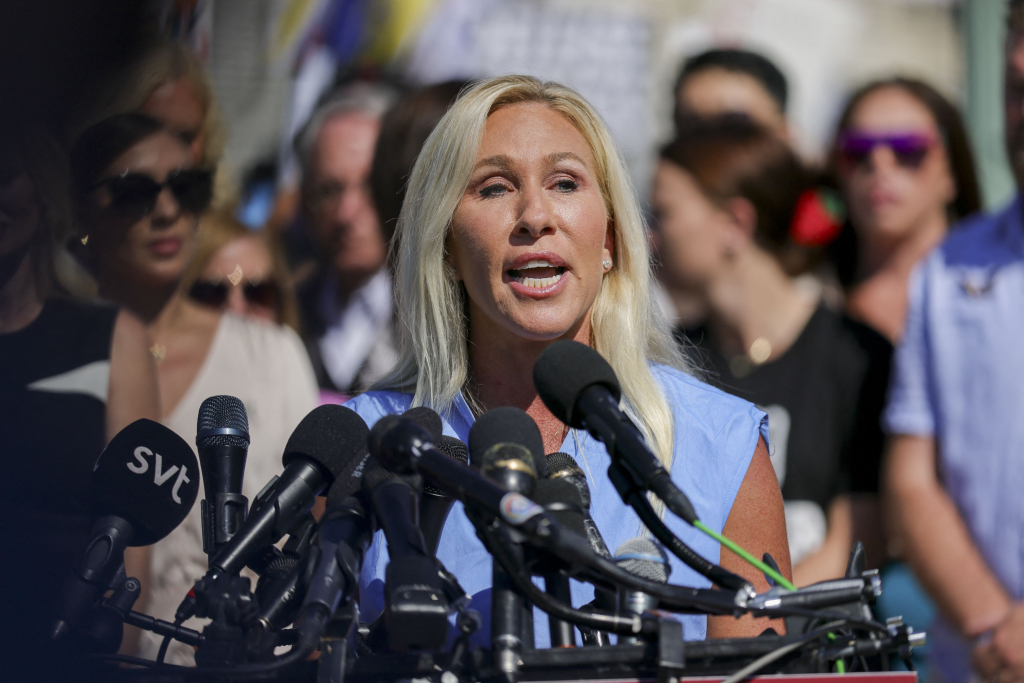
Greene’s interview, billed as a peace offering, unfolded like a family feud at Thanksgiving—warm overtures chilled by pointed jabs that left Bash leaning in with arched brows. On H-1B visas, she swiped at Trump’s support for tech imports, arguing they undercut American coders in a nod to her blue-collar base. On his overseas jaunts—to Riyadh for oil pacts, to Hanoi for trade tweaks—she pressed for “putting Americans first,” a phrase straight from Trump’s ’16 playbook that now felt like a subtle shade. “He’s got the vision, but execution matters,” she said, her words a tightrope walk between fealty and frustration, evoking the 2018 midterms when her own primary foes branded her “too Trumpy” only for her to surge 75 percent. The Epstein anchor held firm, though: Greene, who’d sponsored the 2023 “Justice for Victims of Trafficking Act” expanding survivor funds, framed her stand as moral imperative, not mutiny. “These files aren’t politics—they’re pain,” she told Bash, her voice softening to a hush that hushed the studio, a rare vulnerability from the woman who’d once brandished an AR-15 at school shooting protesters.
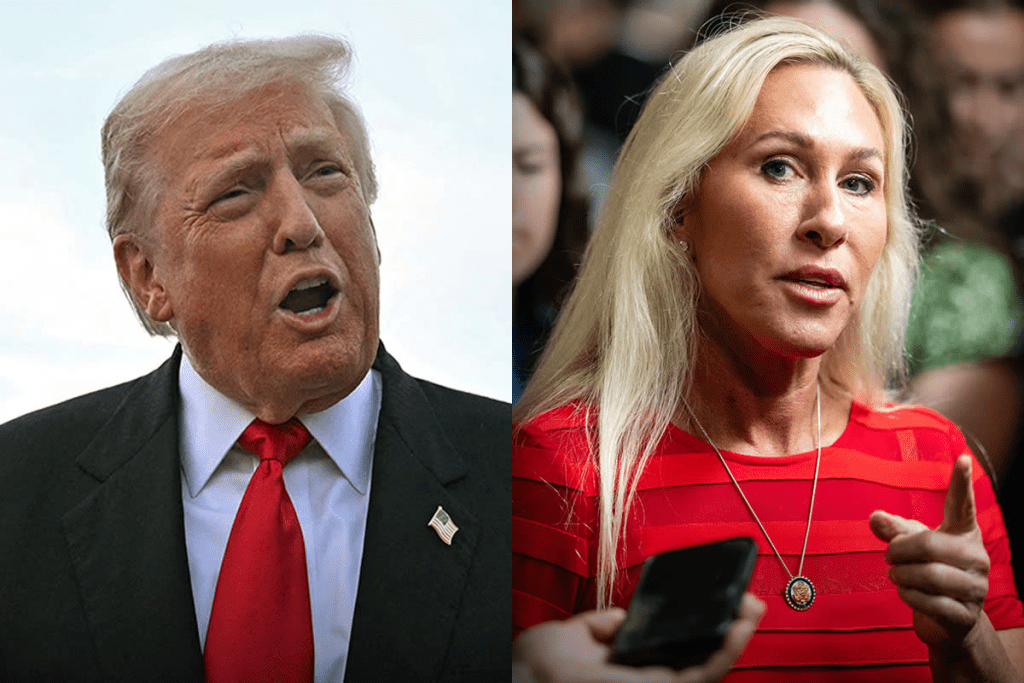
Trump’s silence since Friday’s blast spoke volumes—a president who’d weathered impeachments with tweets now letting the feud fester, his schedule packed with border bill signings and Musk meet-and-greets that sidelined Greene’s pleas. Insiders whisper of a calculated cool: Trump’s team, eyeing 2026 primaries where her seat is a must-hold, sees her swipes as self-sabotage, a “wacky” detour from the unity he demands. Yet for Greene, the daughter of Georgia mill folk who’d risen from CrossFit coach to congressional crusader, it’s survival: her district, a swath of rural red from Chattanooga’s shadow to Atlanta’s exurbs, craves the fighter who filibustered against Ukraine aid in 2024, saving billions for domestic defense. “Marjorie’s our bulldog—she barks at the boss when he strays,” said Tom Hargrove, a 62-year-old farmer from Polk County who’d hosted her farm tour last spring, his calloused hands pausing on a pitchfork as he watched the clip on his phone. Tom’s loyalty, like Rosa’s, runs deep: Greene’s town halls drew 500 in Cedartown, where she vowed to “MAGA harder” post-Trump’s win, her Epstein push resonating with families scarred by elite scandals.
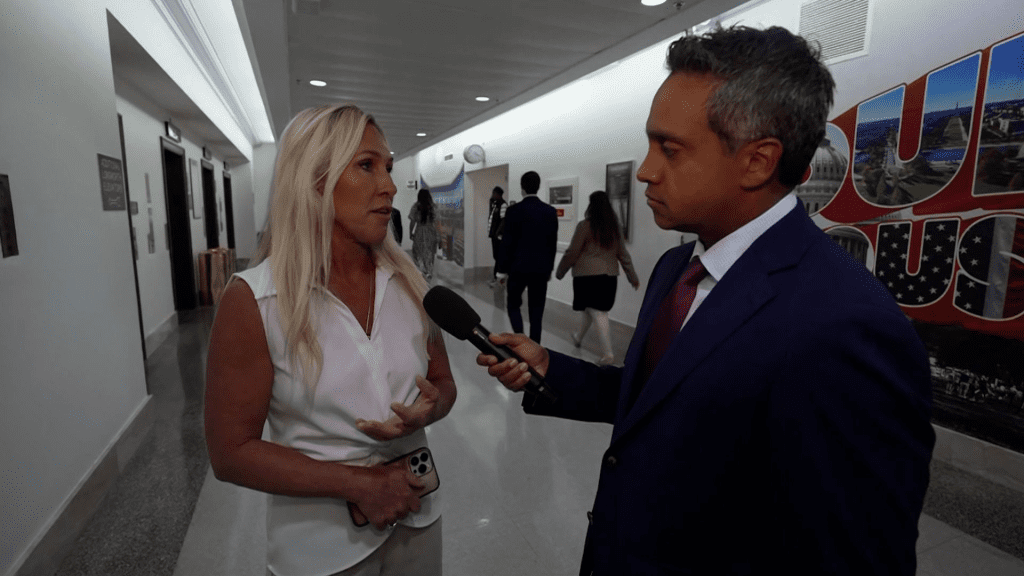
Balance tempers the tempest, though—Greene’s salvos risk alienating the machine that made her, a reminder that in Trump’s world, fealty is currency and criticism a counterfeit bill. Polling from InsiderAdvantage in late October showed 62 percent of Georgia Republicans still viewing her favorably, but a Trump withdrawal could halve that, per strategist Matt McDonald. Her hope for makeup? A olive branch in a briar patch, as she pivots to podcast plugs and prayer breakfasts, framing the feud as “family friction” in a Fox hit that evening. For the MAGA moms and mill dads who’ve made her a star—raising $15 million in ’22 on small-dollar fire—it’s a heart-tug: the warrior wounded but walking, her “I support him” a lifeline tossed amid the roil. As November’s chill settles over the Peach State, with Thanksgiving turkeys thawing and midterms mustering, Greene’s interview lingers like a half-healed scar: proof of a movement’s messiness, where love for the leader clashes with calls for course-correction. Trump’s takedown stings, but Greene’s grit endures—a congressional cautionary of loyalty’s limits, where even firebrands falter but few fold. In the grand GOP tapestry, her thread pulls taut, a reminder that unity’s forged not in silence, but in the brave barks that beckon back to base. And as Trump charts foreign seas, Greene’s voice—from CNN couches to Capitol corridors—whispers wide: support unwavering, but scrutiny sharp, in the endless quest to keep MAGA mighty.


